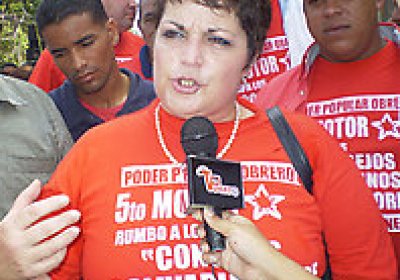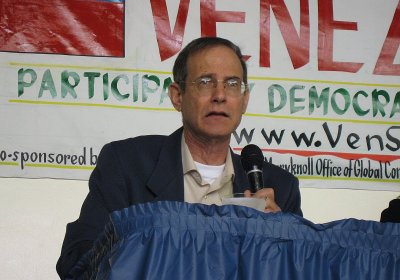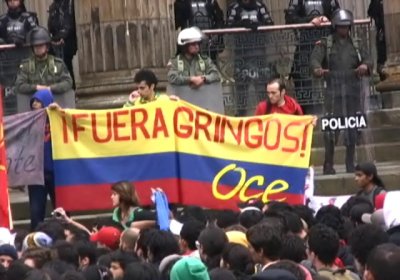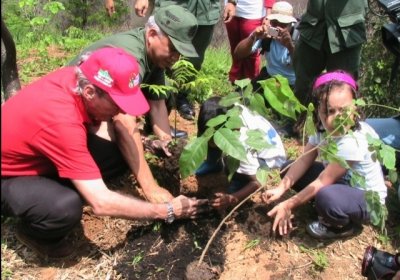On his TV show Alo Presidente on October 3, Venezuela’s President Hugo Chavez drove tractors and inspected corn crops as he pledged to accelerate land reform and increase the government’s share of food production and distribution.
Chavez announced the nationalisation of the agricultural supplies company Agroislena and the Venezuelan properties of the British Vestey Group.
The show took place in Guarico state, where Chavez’s United Socialist Party of Venezuela (PSUV) won most of the state seats in the September 26 National Assembly elections.
Venezuela
Factory workers from the Venezuelan chemical and lubricant company Veneco held a demonstration on the evening of October 10 in Carabobo state to show their support for the company’s nationalisation.
President Hugo Chavez announced the nationalisation that afternoon.
Jose Martinez, the general secretary of the Venoco workers’ union, said: “We are endorsing this takeover that will bring us many benefits.
“It will bring a change from the capitalist mode to the socialist mode and we are going to strengthen our company.”
In September, I spent two weeks on a solidarity brigade in Venezuela. The brigade participants were able to witness the September 26 National Assembly elections and get a first hand view of the revolutionary changes taking place across the country.
The brigade was organised by the Australian Venezuelan Solidarity Network (AVSN), and included political activists and enthusiasts from Ausstralia, New Zealand, Bulgaria, Britan, Canada and the United States.
I would thoroughly suggest this experience to anyone interested in the Venezuelan revolution.
On September 28, a British Guardian reporter who interviewed me by phone published an article on the September 26 Venezuelan National Assembly elections titled “Opposition Gains Loosen Chavez’s Grip on Power.”
According to the article, I said the electoral results “suggested the government should try to modify its radical discourse and accommodate the opposition, as long as it accepted the government’s legitimacy”.
Venezuela’s September 26 National Assembly elections gave an interesting insight into the state of class struggle in a country sharply polarised by the revolutionary changes led by the government of President Hugo Chavez.
The significance lies in the vote occurring after 11 years of the Chavez-led Bolivarian revolution, which has resulted in big improvements in the living standards of the poor majority.
In the parliamentary elections on Sunday 26 September, the PSUV [United Socialist Party of Venezuela] won a volume and distribution of votes that gave it a simple majority of deputies in the National Assembly.
The triumph of socialist candidates preserves the political continuity of the democratic process led by President Hugo Chavez, and shows that the bulk of the population prefers the anti-capitalist and socialist path.
As if straight out of a Cold War era movie, US corporate media outlets such as the Miami Herald ran headlines on September 18 claiming scientists from Albuquerque “tried to sell classified nuclear data to Venezuela”. Readers were no doubt shocked to read in the Miami Herald that “an elderly maverick scientist who battled the scientific community for decades over laser fusion was indicted Friday in New Mexico, charged with trying to sell classified nuclear weapons data to Venezuela”.
In the lead-up to the September 26 national Assembly elections, Venezuelan President Hugo Chavez called on workers to not allow the right-wing opposition to halt the advance of the Bolivarian revolution.
Chavez, who is also president of the United Socialist Party of Venezuela (PSUV), made the call on September 15 while addressing the Socialist Electrical Workers Front Braulio Criollo.
Faced with acts of sabotage in various electrical substations across the country, Chavez urged workers to not lower their guard.
As Venezuela’s September 26 National Assembly election time approaches, international media have increased negative coverage of the South American nation.
The bombardment of negative, false, distorted and manipulated news about Venezuela in US media has increased in volume and intensity during the last few days.
Venezuela is subjected to this every time an election nears. This international media campaign against the left-wing government of Venezuelan President Hugo Chavez appears to have a clear and coordinated objective: removing the Chavez from power.
Venezuela’s decision to re-establish diplomatic, political and economic relations with Colombia on August 10 was only possible thanks to a range of circumstances and actions.
Venezuela cut ties on July 22 in the face of allegations made by Colombia at the Organisation of American States (OAS) of alleged Venezuelan support for left-wing Colombian guerrillas. The Venezuelan government said the allegations were part of an attempt, backed by the US, to spark a war between the two nations.
A huge transformation of agriculture is taking place in Venezuela, a transformation that has lessons for every other country in the world. I had the opportunity in July to visit the country and see the changes that are taking place first hand.
Venezuela’s Law of the Land and Agrarian Development, the Law of Food Sovereignty and Security, and the Law of Integrated Agricultural Health set out the agenda.
One of Venezuela’s state-run food supply networks increased by 70% its sales in July, Edward Ellis reported in the Correo del Orinoco International on August 13.
Ellis said commerce minister Richard Canan told Venezuelan television program Desperto Venezuela of a record income for the Bicentennial Markets, which took in a total of US$56.5 million in July.
Ellis said Canan, a member of socialist President Hugo Chavez’s government, reported a 2.1 million people visited the markets in July, an increase of 35%.
- Previous page
- Page 57
- Next page











